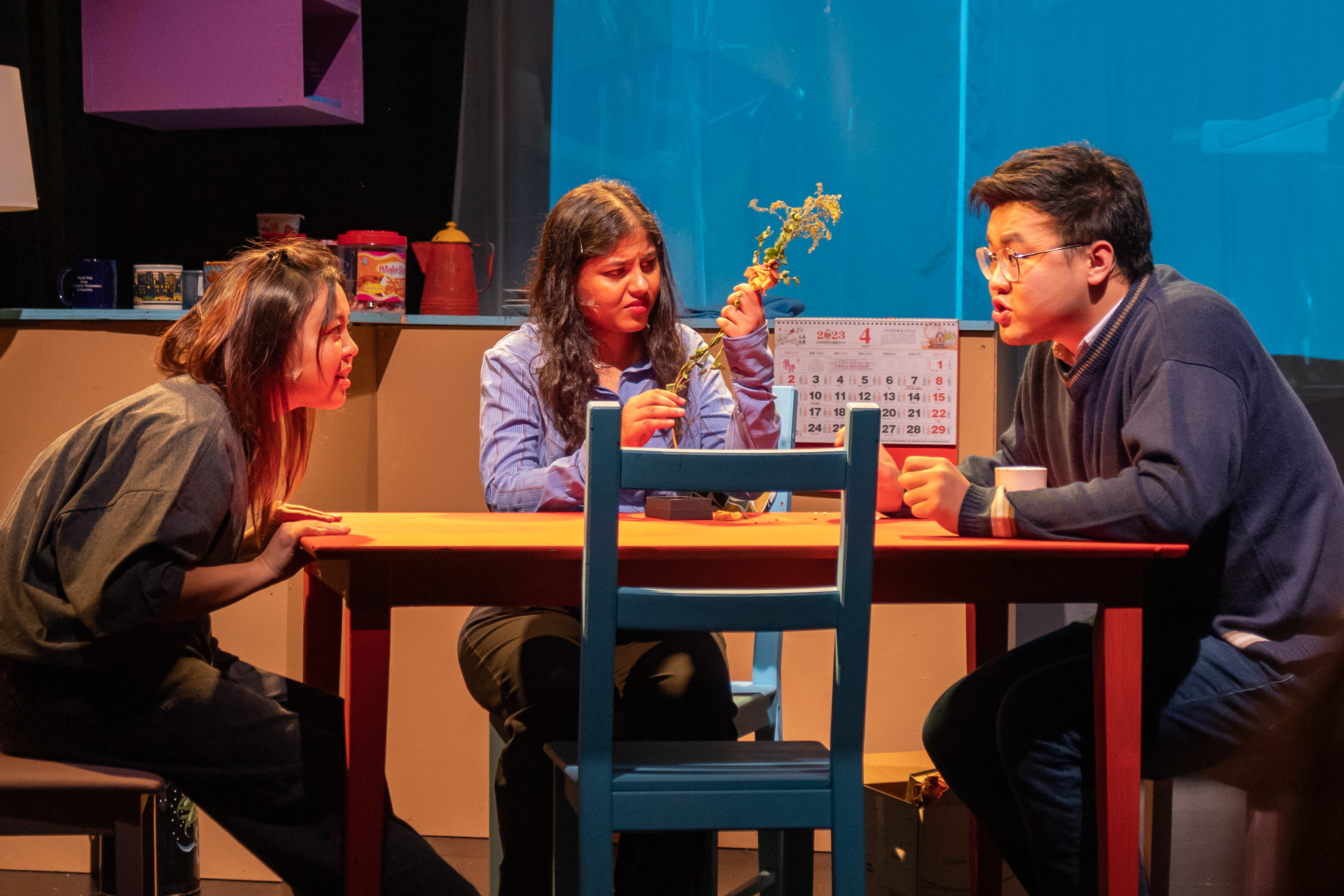The lights dim and we turn our focus on the dining table. A red dining table with a set of mismatched chairs of pink and blue sits center stage. The mother, Diana, stands in the kitchen when her son, Gabe, enters the door. Her daughter, Natalie, brushes past them, ignoring Gabe’s “Good morning.” We hear the footsteps of their father, Dan, making his way to the kitchen as Diana tells Gabe, “Make sure your father doesn’t see you.”
Even as this appears to be an ordinary home, the perfect family is about to break.
The Asian American Theater Project’s (AATP) production of “next to normal” was a thrilling musical that drew out raw and emotional performances from the actors. It depicted the story of a family fighting for a “normal” life as a mother mourns the death of her son, whom she hallucinates to be around; a father struggles to keep the house’s ceiling from collapsing; and a daughter balances between presenting as a perfect child and trying to escape a neglectful home.
In accordance with themes of healthcare, healing and complexities of love, the show weaved through experiences of memory and the pain of the past. For one, it is gradually revealed that Gabe (JC Chien ’23) is not an active member of the family — he died of a sickness that went unnoticed.
The cast was phenomenal, adding their own experiences to help embody the characters. They did it in a way that was relatable and comical, while still presenting the serious issues in a way that was easy to grasp. The performance was in sync, clearly showing the connection between the cast members. Truly, the process and the community that came together to create this show were as important as the outcome.

In one scene, Diana (Sheruni Pilapitiya ’26) begins to question her past after losing her memory due to electroconvulsive therapy, wondering who she is not remembering. She picks up a music box and the lights dim, focusing all attention on her. The ensemble plays a soft, twinkling melody and Diana slowly remembers the missing member of her family. The lighting and music made for an immersive moment allowing us to put into perspective what we need to see and what we shouldn’t and making us feel emotions without telling us. The moment teaches us that you can take away a memory, but you can never erase the past and the impact it had.
Themes of holding on to the past, discovering yourself and being set free are present throughout the show.
For instance, Natalie relies on accomplishments to gain visibility from her inattentive parents. Her dedication to piano and education is a way to seem normal despite the tragedy the family is going through. It becomes clear by the end of the play that her focus on perfection is actually a part of her grief for Gabe, something she never knew but was always there.
It impacts her relationships with her parents as well as her love interest Henry (Josh Tikare ’26). Tikare’s portrayal of Henry gave a heartwarming performance contradicting the family’s agonizing loss with his optimism.
Diana was a representation of the family’s flaws; she was divided between reality and fantasy, causing her psyche to fracture and get lost in the spaces between. For instance, Diana buys a cake one evening for Gabe’s birthday, forgetting that he is gone. Dan (Robert Castaneros ’24) seats her down and reminds her that Gabe is no longer here. That’s when Gabe — Diana’s vision — and Dan break into song to a spectacular performance of “You don’t know,” the song being a battle between Diana’s husband and son fighting for her attention and love. Their powerful vocals encapsulated the emotions of the characters, allowing the audience to truly feel what they did.
This scene was one of Diana’s breakdowns, and Pilapitiya realized the emotions the character was feeling with her expressions and tone of voice. The actor said she wanted to highlight this meaningful journey of being able to “explore all these things that resonate with so many people.”
Regarding his role, Chien had to say how incredible it was “being able to be in a space where [you] connect with everybody on a heartfelt mental level.”
Celio spoke about how amazing it was to put herself in the shoes of these characters and decide “what parts of ourselves we are bringing into [them].” Tikare brought support for her, echoing his character’s representation of the importance of having someone to count on. On the importance of Henry, he said, “the role itself was difficult because it [dealt] with serious topics and being a supportive figure for Natalie was important … it required maturity to think about my [portrayal] of the character and how it came to life.”
Through the musical, I can’t help but see a correlation to how the show resonates with the Asian American community and their struggles, especially through the direction of the AATP. Director Chloe Chow ’23 acted as a visionary, putting together various pieces of the show and her community to create an unforgettable performance.
Chow said she didn’t know much about Asian American theater until she came to Stanford. Still, according to her director’s note, she had a vision of the show she wanted to make that included her own experiences with her family and the Asian American community, specifically in regard to mental health. She also said that she wanted to reimagine “a popular musical to really see how Asian American bodies on stage would affect the way the audience creates a narrative.”
This is a performance that I believe everyone can relate to and learn from in some way. We are all complex and never just normal. At the end of the day, aren’t we all just next to normal?
